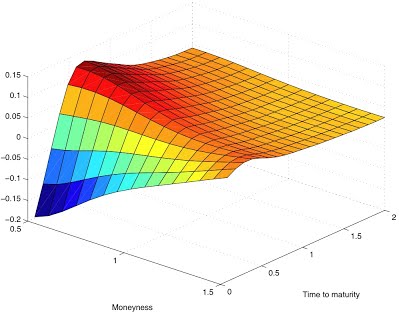The core of the program consists of six Mathematics courses and two Finance courses (22 credits total). These courses are designed to provide the necessary mathematical and statistical foundations of the degree.
MTH 642: Statistical Analysis, 3 credits.
Statistical inference about one or two populations from interval, ordinal, and categorical data; analysis of variance; simple and multiple linear regression; designing research studies.
MTH 643: Statistical Analysis II with Financial Applications, 3 credits.
Exploratory data analysis. Designing parametric models and assessing their uncertainty. Techniques for resampling. Using multivariate distributions to model financial data; families of copulas. Analyzing time series, including ARIMA and GARCH models.
MTH 645: Optimization Methods, 3 credits.
Linear optimization: simplex method and simplex tableaus, sensitivity analysis. Quadratic optimization and its applications in finance: risk modeling and portfolio construction. Integer programming techniques, branch and bound method. Dynamic programming – deterministic and probabilistic techniques. Software tools of optimization.
MTH 647: Introduction to Mathematical Finance, 3 credits.
Models of financial markets. Derivative securities: European and American options. Tools of mathematical finance: binomial trees, martingales, stopping times. Concepts of arbitrage and hedging. Risk-neutral valuation of financial derivatives; the Black-Scholes formula and its applications.
MTH 648: Stochastic Calculus with Applications to Finance, 3 credits.
An introduction to Stochastic Calculus developing the basic probabilistic techniques necessary to study analytic models of financial markets. Brownian motion and the stochastic integral, stochastic differential equations, the Black-Scholes formula, Girsanov’s theorem and applications to option pricing.
MTH 649: Computational Methods of Finance, 3 credits.
Solutions of nonlinear equations, interpolation, Monte Carlo methods, survey of matrix factorizations, numerical integration and differentiation, and introduction to finite difference and finite element methods for PDEs with applications to finance.
FIN 650: Financial Investments, 2 credits.
This course builds on FIN 641 and FIN 642 to provide a more advanced knowledge of the field of investments, particularly the fixed income markets, portfolio construction, asset pricing, and behavioral biases affecting financial decisions.
FIN 651: Advanced Topics in Investments, 2 credits.
This course is about applying finance theory to the practice of investments. Topics include building a term structure model, building a fixed income portfolio, performance standards and measurement, and the role of futures and options in portfolios.





